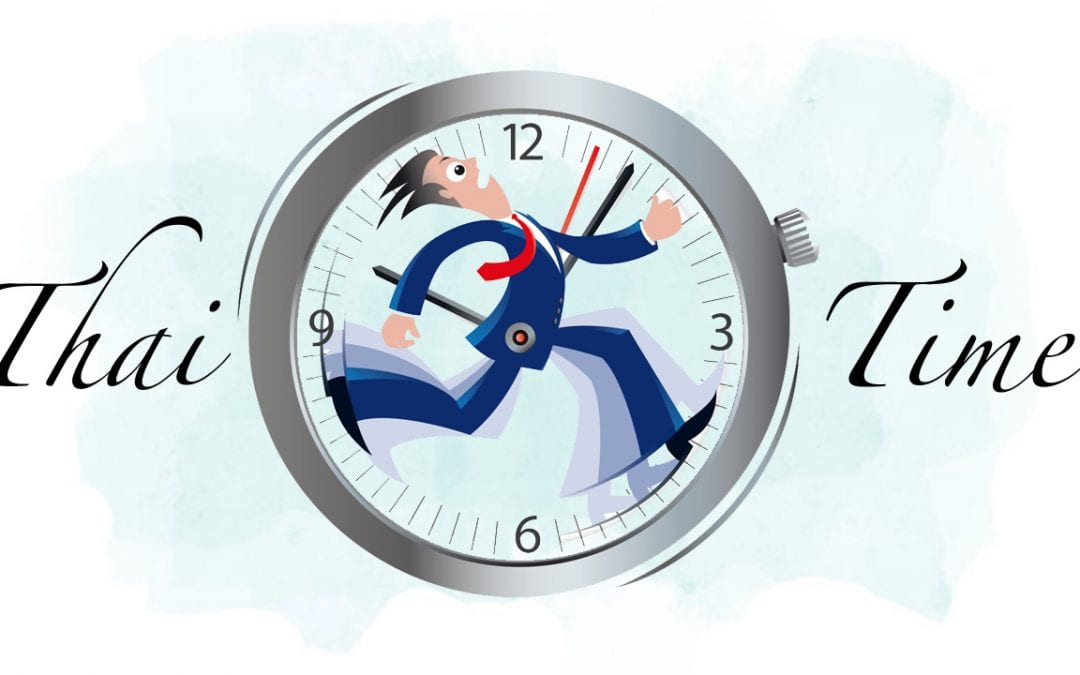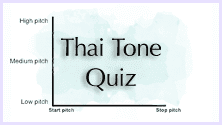How do you talk about Time in Thai?
I have written this to help learners better understand about time concepts in Thai language.
Most Thais find it difficult to explain about time as it is quite sophisticated, hard to comprehend and we think differently to English in some situations. However, I am breaking the grammar rules and explain to you in syntax. I hope it can help learners to think more like a Thai to speak like a Thai.
What is ‘time’?
Answer:
– Time is abstract, vague and indefinite.
– Time is the indefinite continued progress of existence and events in the past, present, and future regarded as a whole.
– Humans measure time to be able to communicate and to comprehend.
– Time is measured according to the rotation of the world and orbit around the Sun.
– Seconds, minutes, hours, days, weeks, years, decades, centuries, millenniums, …..(indefinite)…. are measurements of time (classifier/unit words for time).
– O’clock, hours, a.m. and p.m. are measurements of time during one day (unit words for time) used to specify hours when telling the time.
In Thai we think about time in our own way, we have our own time measurement words and we have our own way to indicate time.
When indicating time, there are three formats detailed below; 1. Tense, 2. Time Period and 3. Time Preposition
1. Tenses (Tense words)
What is ‘tense’ in English?
Answer : Tense in English is a set of forms taken by a verb to indicate the time (and sometimes also the continuance or completeness) of an action in relation to the time of the utterance. e.g. ‘go’ is used to indicate ‘present tense’, ‘went’ is used to indicate ‘past tense’ and ‘gone’ is used to indicate ‘perfect tense’.
In Thai language, there aren’t any tense forms like in English. Instead, there are three ways to indicate tenses by using context, tense words or time words.
Example tense words; กำลัง : Gum-lung, อยู่ : Yùu, กำลังจะ : Gum-lung~Jà, จะ : Jà, ได้ : Dâi, แล้ว : Láew etc.
Tense words are divided into two groups;
I) Tense words that are used to emphasise the verb (usually action verb) which are used in front of a verb.
Examples
ฉันจะกินข้าวนะ
Chŭn + Jà + Gin + Kâaw + Ná
I (female) + will + to eat + food/rice + emphasis particle
= I will eat some food/rice, alright?
(จะ : Jà is used to indicate the verb (action and state) will happen)
II) Tense words that are used to emphasise the event which are used after a sentence.
Examples
ฉันจะกินข้าวแล้วนะ
Chŭn + Jà + Gin + Kâaw + Láew + Ná
I (female) + will + to eat + food/rice + already + emphasis particle
= I am about to eat some food/rice, alright?
(แล้ว : Láew is used to emphasise the event will be happening already/about to happen already)
ฉันกินข้าวแล้วนะ
Chŭn + Gin + Kâaw + Láew + Ná
I (female) + to eat + food/rice + already + emphasis particle
= I have eaten some food/rice, alright!
(แล้ว : Láew is used to emphasise the event has happened already)
2. Period of time (Time words and time phrases)
What is a ‘time word’?
Answer : A time word indicates a specific period of time by itself.
Examples
วันนี้ : Wun~Née = today (on or during the course of this present day),
พรุ่งนี้ : Prôong~Née = tomorrow (on or during the course of tomorrow)
โมง : Mong = peroid of time from 6 am to 6 pm.
(Note, In English you call these words ‘adverbs’)
What is a ‘time phrase’?
Answer : A time phrase indicates a specific period of time by itself. Time phrases are usually combined from time words, time units, quantity and time modifiers.
Examples
สองวันที่แล้ว : Sŏrng Wun Têe~Láew = two days ago
อาทิตย์หน้า : Aa-tíd Nâa = next week
สองชั่วโมงที่แล้ว : Sŏrng Chûa~Mong Têe~Láew = two hours ago
(Note, In English you call these ‘adverb phrases’).
A time word and time phrase can be used before or after a sentence as in English. e.g. Today, I work or I work today.
What is a ‘time modifier’?
Answer : A time modifier is used to modify time words.
Examples
ที่แล้ว : Têe~Láew = [time modifier] ago, last, (time) that passed
หน้า : Nâa = [time modifier] next, (time at the) front
3. Position of time (Time prepositions)
What is a preposition?
Answer : A preposition is a word expressing a relation of two things, as in ‘the man on the platform’, ‘she arrived after dinner’, ‘what did you do it for ?’.
Prepostion can be divided into different types but in this article I will only explain about time prepostion.
What is a time preposition?
Answer : A time preposition is a word expressing a relation between two events.
Examples
ฉันกินข้าวก่อนดื่มน้ำ
Chŭn + Gin + Kâaw + Gòrn + Dùeem + Núm
I (female) + to eat + food/rice + before + to drink + water/liquid
= I eat food/rice before I drink water.
เขากลับบ้านหลังจากทำงาน
Kăo Glùb Bâan Lŭng~Jâak Tum Ngaan
he/she + to return (to a place) + home/house + after + to do + job + work
= she returns home after work
ฉันกินข้าวก่อนนะ
Chŭn + Gin + Kâaw + Gòrn + Ná
I (female) + to eat + food/rice + before + emphasis particle
= I eat food/rice before (doing other things), alright?
= I eat food/rice first, alright?
สองวันก่อน ทอมมาบ้าน
Sŏrng Wun Gòrn, Tom Maa Bâan
two + day + before …., …(name)… + to come + home/house
= Two days before (today), Tom came home.
= Two days ago, Tom came home.
Time preposition can be used in all tenses by adding tense words or time words.
Examples
ฉันจะกินข้าวก่อนดื่มน้ำ
Chŭn + Jà + Gin + Kâaw + Gòrn + Dùeem + Núm
I (female) + will + to eat + food/rice + before + to drink + water/liquid
= I will eat some food/rice before I drink water.
ฉันได้กินข้าวก่อนดื่มน้ำแล้ว
Chŭn + Dâi + Gin + Kâaw + Gòrn + Dùeem + Núm + Láew
I (female) + did/have + to eat + food/rice + before + to drink + water/liquid + already
= I did eat some food/rice before I drank water already.
= I have eaten some food/rice before I drank water already.
เมื่อวานนี้ ฉันได้กินข้าวก่อนดื่มน้ำ
Mûea~Waan~Née, Chŭn + Dâi + Gin + Kâaw + Gòrn + Dùeem + Núm
yesterday, I (female) + did/have + to eat + food/rice + before + to drink + water/liquid
= Yesterday, I did eat some food/rice before I drank water.
= Yesterday, I have eaten some food/rice before I drank water.
Time can travel
In Thai we think time has its period, a position and it can travel and has direction. We think whatever we do the event can travel with time.
We think the current place and time is the center of everything when the speaker says something.
Examples
เขาทำงานอยู่
Kăo Tum Ngaan Yùu
he/she + to do + job/work + be in the current location of time
= He is working at the moment.
Note : อยู่ : Yùu = verb to be (is/am/are) used to indicate the location in a place or time.
– Action and time in the past move/travel/come towards or into the current place and time. When we think like this we use the action direction word มา : Maa as a tense word at the end of the sentence to indicate time.
– Action and time at the current place and time will move or travel away towards the future. When we think like this we use the action direction word ไป : Bpai as a tense word at the end of the sentence to indicate time.
Examples
เขาทำอะไรมา
Kăo Tum À-rai? Maa
he/she + to do + what + up until the current place and time
= What had he done up to now?
คุณทำงานไปนะ
Koon Tum Ngaan Bpai Ná
you + to do + job/work + go toward the future place and time + emphasis particle
= You continue working, alright.
There are more words to indicate tenses, time periods, time preposition, etc. which you will need to learn how to use. When using them, just remember how we think in Thai about these words. Think like a Thai to speak like a Thai.
Also, another concept about time in Thai is to be relaxed. Don’t worry if it is five minutes late 🙂
โชคดีค่ะ : Chôk~Dee Kâ = Good luck!
By Kruu Jíab (ครูเจี๊ยบ)
All rights reserved – Thai Style Language Co. Ltd. – www.learnthaistyle.com




